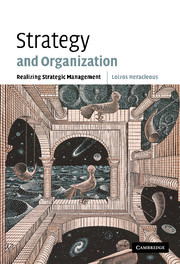Book contents
- Frontmatter
- Contents
- List of figures
- List of tables
- Preface
- I Bases of strategic management
- II Realizing strategy
- III Current themes and applications
- 9 State ownership, privatization, and performance
- 10 Does corporate governance make a difference to organizational performance?
- 11 Types of inter-organizational networks and the strategic roles of directors
- 12 Organizing for the future
- Index of names
- Index of subjects
- References
9 - State ownership, privatization, and performance
Published online by Cambridge University Press: 11 May 2010
- Frontmatter
- Contents
- List of figures
- List of tables
- Preface
- I Bases of strategic management
- II Realizing strategy
- III Current themes and applications
- 9 State ownership, privatization, and performance
- 10 Does corporate governance make a difference to organizational performance?
- 11 Types of inter-organizational networks and the strategic roles of directors
- 12 Organizing for the future
- Index of names
- Index of subjects
- References
Summary
While the traditional belief, supported by empirical work, has been that private ownership is generally associated with superior performance, the experience of Singapore is an example to the contrary. This chapter outlines global privatization trends and the impact of privatization programs. Using a variant of the organizational action (OA) view as a theoretical framework, Singapore Telecom is analyzed as a case where state ownership combined with several contextual and firm-related factors, especially firm strategy, has led to sustained world-class performance relative to its peers. This analysis challenges the widely held position that public ownership is associated with inferior performance and points to the importance of strategy as a key factor in aiding superior performance even under public ownership. Some theoretical and practical implications of the analysis are then outlined.
Global trends and the impact of privatization
The push to expand state ownership in the 1960s and 1970s met with a radical reversal in the 1980s, when governments progressively reduced their involvement in service provision by increasing private sector involvement, especially in the areas of power generation, telecommunications, water provision, and transport services, with significantly higher private sector involvement in the first two (Price Waterhouse 1996). Privatization in broad terms involves the transfer of ownership and/or control of state-owned organizations to private investors.
- Type
- Chapter
- Information
- Strategy and OrganizationRealizing Strategic Management, pp. 149 - 167Publisher: Cambridge University PressPrint publication year: 2003



